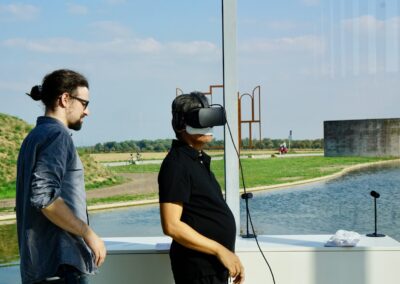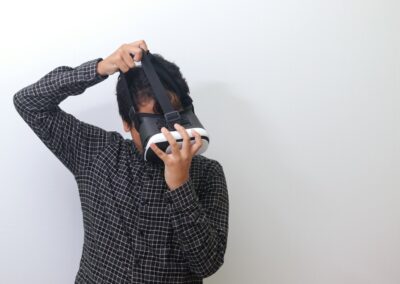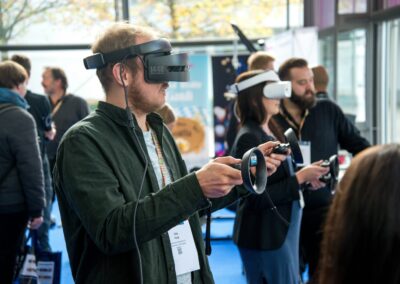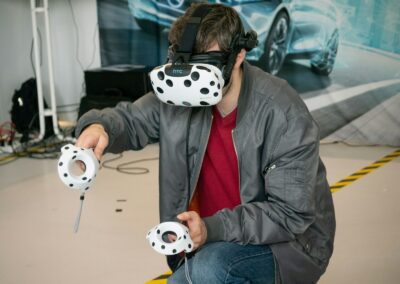Transforming Leadership and Communication through Immersive Technology
Virtual reality soft skills training is emerging as a powerful tool for business leaders and executives looking to enhance their leadership and communication capabilities. In today’s fast-paced corporate environment, soft skills such as effective communication, empathy, and adaptability are critical for driving business success and fostering a productive work culture. By leveraging the immersive nature of virtual reality (VR), organizations in Saudi Arabia and the UAE are pioneering innovative approaches to executive coaching and change management.
Revolutionizing Training in Saudi Arabia and the UAE
The adoption of virtual reality soft skills training in Saudi Arabia and the UAE signifies a significant shift in how businesses approach employee development. In Riyadh and Dubai, companies are integrating VR into their training programs to provide a more engaging and effective learning experience. Unlike traditional training methods, VR simulations offer realistic scenarios where participants can practice and refine their soft skills in a controlled, risk-free environment. This approach not only enhances the learning process but also ensures that employees are better prepared to handle real-world challenges.
Enhancing Executive Coaching with VR
Executive coaching services are evolving with the integration of VR technology. Through immersive simulations, executives can develop critical soft skills such as leadership, decision-making, and conflict resolution. For instance, a VR simulation might place an executive in a high-stakes negotiation scenario, requiring them to apply effective communication strategies and emotional intelligence to achieve a successful outcome. This hands-on approach to learning helps executives build confidence and competence, ultimately contributing to their overall effectiveness as leaders.
The Role of VR in Effective Communication
Effective communication is a cornerstone of business success, and VR technology is playing a pivotal role in enhancing this skill among professionals. In the context of management consulting and project management, VR-based training programs can simulate complex team interactions and stakeholder meetings, allowing participants to practice their communication techniques and receive instant feedback. This real-time feedback loop is invaluable for refining communication strategies and ensuring that messages are conveyed clearly and persuasively.
Fostering Business Success through VR Training
By incorporating virtual reality soft skills training into their professional development programs, businesses in Saudi Arabia and the UAE are setting a new standard for employee training and development. VR training not only improves individual performance but also contributes to overall organizational success. Employees who are proficient in soft skills are better equipped to collaborate, innovate, and drive business growth. As a result, companies that invest in VR training are likely to see enhanced team dynamics, increased productivity, and a stronger competitive edge in the marketplace.
Integrating Advanced Technologies in Training Programs
The integration of advanced technologies such as Artificial Intelligence (AI), Blockchain, and the Metaverse further enhances the effectiveness of VR soft skills training. AI can provide personalized learning experiences by adapting simulations to the specific needs and skill levels of each participant. Blockchain technology can ensure the security and authenticity of training records, providing a transparent and tamper-proof system for tracking employee progress. Meanwhile, the Metaverse offers a virtual world where employees can engage in collaborative learning experiences, transcending geographical limitations and fostering a global exchange of ideas.
Generative AI and the Future of VR Training
Generative AI is revolutionizing the landscape of VR training by creating dynamic and adaptive simulations that respond to user inputs in real time. This technology enables the creation of highly realistic training scenarios that mimic the complexity and unpredictability of real-world interactions. For example, a generative AI-powered VR simulation might adjust the behavior of virtual characters based on the user’s actions, providing a more immersive and challenging training experience. By pushing the boundaries of what is possible with VR, generative AI is helping to develop the next generation of business leaders and professionals.
Conclusion: Embracing the Future of Training
The adoption of virtual reality soft skills training in Saudi Arabia and the UAE is a testament to the region’s commitment to innovation and excellence in business. By leveraging the power of VR, organizations can provide their employees with cutting-edge training experiences that enhance their soft skills and prepare them for the challenges of the modern workplace. As VR technology continues to evolve, it will play an increasingly important role in executive coaching, change management, and professional development, driving business success and fostering a culture of continuous improvement.
hashtags: #VirtualRealityTraining #SoftSkills #ExecutiveCoaching #BusinessSuccess #Innovation #LeadershipDevelopment #EffectiveCommunication























